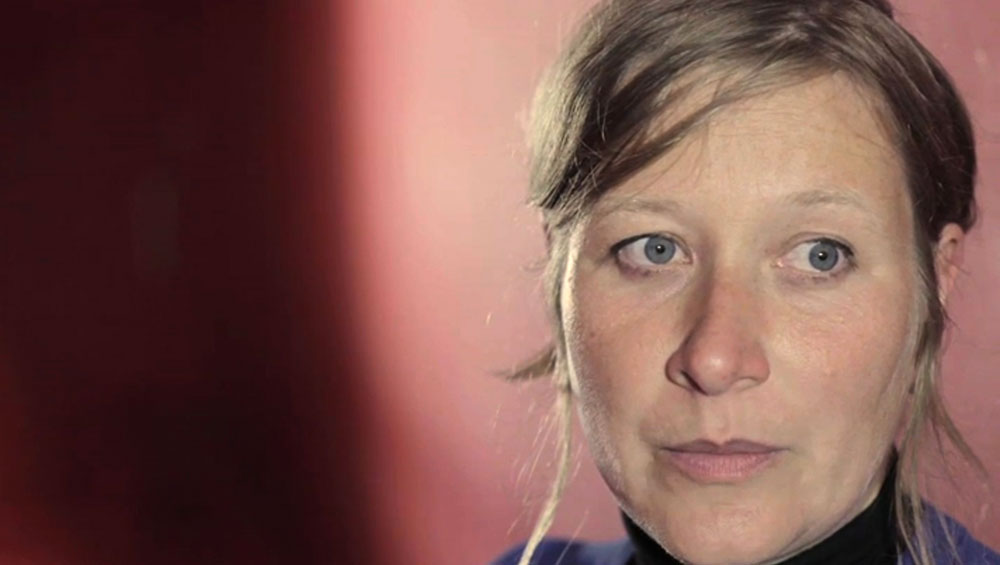
Image courtesy Nicoline van Harskamp.
by SKYE ARUNDHATI THOMAS
“Ich bin Mohammed,” began the Dutch artist Nicoline van Harskamp’s performance My Name Is Language at last year’s Steirischer Herbst Festival in Graz, Austria. We were seated in a tightly packed room that resembled a very particular type of waiting room: to me, it looked – and to an extent, felt – like the detention rooms that I have sometimes been made to sit in at airports (which are usually a few floors underground). These are terrifying, nerve-racking places of transit, where the threat of the law hangs over those in the room. But in Van Harkamp’s version, something rather beautiful happened: one by one, the people seated in the room began long, artful monologues, carefully explaining where they were from, who gave them their names and what they meant. Names became a powerful anecdote about culture and the hybridity of oral history. Van Harskamp created a kind of ideal version of those detention rooms – or, for that matter, any rooms that throw a person’s identity into question. She turned them into a place of sharing, solidarity and a gathering of shared history.
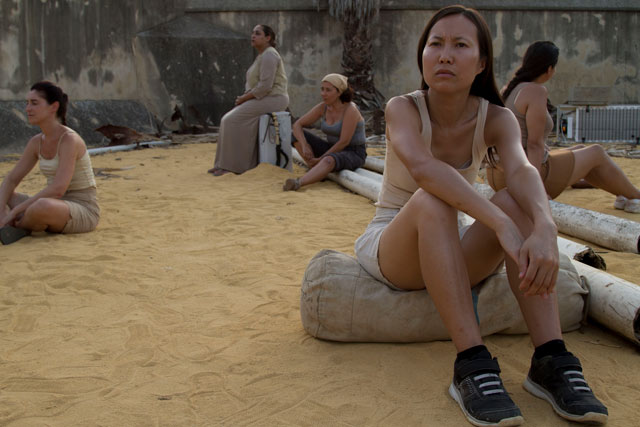
Nicoline van Harskamp. PDGN, 2016. Video still.
Van Harskamp has been long obsessed with language. An earlier work, PDGN (2016), shows a group of people experimenting with the “ruins of English”. It is a post-post-capitalist society where everyone is struggling to make meaning from the post-apocalyptic debris. Towards this, Van Harskamp constructs a whole new language; and it is important to say that we are neither in a utopia nor a dystopia in the work. Where we are simply … is. Van Harskamp is less concerned with “native” languages (in fact, she actively questions the legitimacy of nativity) and more interested in the “vehicular” ones – those we use in the absence of a shared language. English, of course, is one of the most widely used vehicular languages in the world. Her preoccupations with it are thus a careful forensics of listening. She actively looks for the traces that different “Englishes” carry, of place, class, crisis, trauma or displacement. Language is an elastic, pregnant material to her, and much of her work is interested in what she calls “linguistic biographies”.
The artist, 43, lives and works in Amsterdam. Her most recent exhibitions include Englishes, at the Project Art Centre in Dublin, Ireland, and a presentation in Oberhausen, Berlin, where My Name Is Language was a temporarily installed in the city’s register office. This site-specificity is important to Van Harskamp. Her work has a deep political potential that is carried by the perseverance of a simple, but astute premise: what can language tell us about the future and our shared histories?
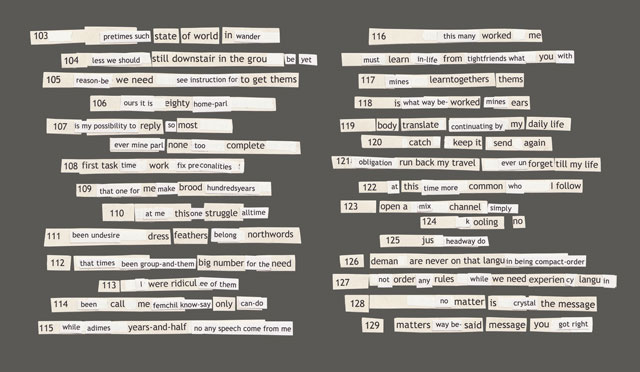
Nicoline van Harskamp. Englishes, 2013-16. Text collage / Exhibition Poster BAK, Utrecht.
Skye Arundhati Thomas: I was glad to see My Name Is Language (2018-19) at Steirischer Herbst 2018 in Graz, Austria. It has since travelled to Dublin and Oberhausen in Germany. How did you conceptualise this piece?
Nicoline van Harskamp: I have been working on a series about the history of English and the future of English – called Englishes – since 2013. One of its first presentations was at the Project Art Centre in Dublin in 2018, which was interesting because of the Irish context: (except for Malta) Ireland will be the only English-speaking country left in the EU after Brexit. I was interviewing people on the use of Irish and English names, which is a huge topic there, and I realised that once you start thinking about names as language, that’s when people get very upset or very excited. Hence the title of the work.
At Steirischer Herbst, I localised the performance for an Austrian context. There the issue is over titles: where titles are part of the name, or even replace the name altogether. I also learned about the Germanification of Slavic names, and how the informal multilingualism of the Austro-Hungarian empire isn’t reflected in the formal names of that period. So, today’s Austrian names give us an understanding of which languages have been marginalised since the empire. We were also interviewing those who had just arrived in Austria – refugees mostly – and realised that their stories had to be told by those who experienced them first hand. Some of them were already trained actors and performers or had an interest in theatre. For instance, two of the people we interviewed – out of interest about names in their languages, and their experience of translating their names – turned out to have had training in acting in their home countries.
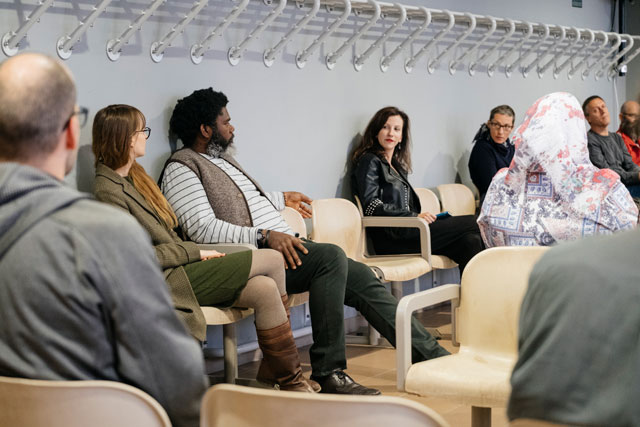
Nicoline van Harskamp. Mein Name ist Sprache (My Name is Language), 2018. Steirischer Herbst, Graz. Photo: Clara Wildberger.
A central question was always about what happens when a name is translated or entered into a register in a different language, culture or system. How does the name change, and how does that affect the life of the owner of that name, or the carrier of the name? We also asked very simple questions: what is your name, what does it mean in your language and who gave it to you? We were trying to get to the core of what it means to change language, what it means to change country, and what it means to change culture. People were eager and willing to tell their stories. Some moved on to other people’s stories, or took a kind of topical approach. In the performance, there are actors who retell complex stories, while other storytellers narrate their own stories.
SAT: The performance brings together several different languages, which gives it a global reach and makes it totally gripping. Did this happen organically?
NVH: People are constantly “code switching” (moving easily from one language to another) in certain parts of the world. When I developed the script for My Name Is Language I already knew who would play whom, and in which language each actor had chosen to work. I let the audience read subtitles so they could follow everything; I knew from the start that the subtitles would very much be a part of the set. The subtitles allow for an extra narrative device: the translations do not only pertain to the words spoken by the actors, but also their names. The translated names come up in a different typeface? so that they can be integrated into regular speech. For instance, one line goes: “My aunt, the one who is pure, was always known as the one who is gracious, but on her gravestone it says the one who brings joy.”
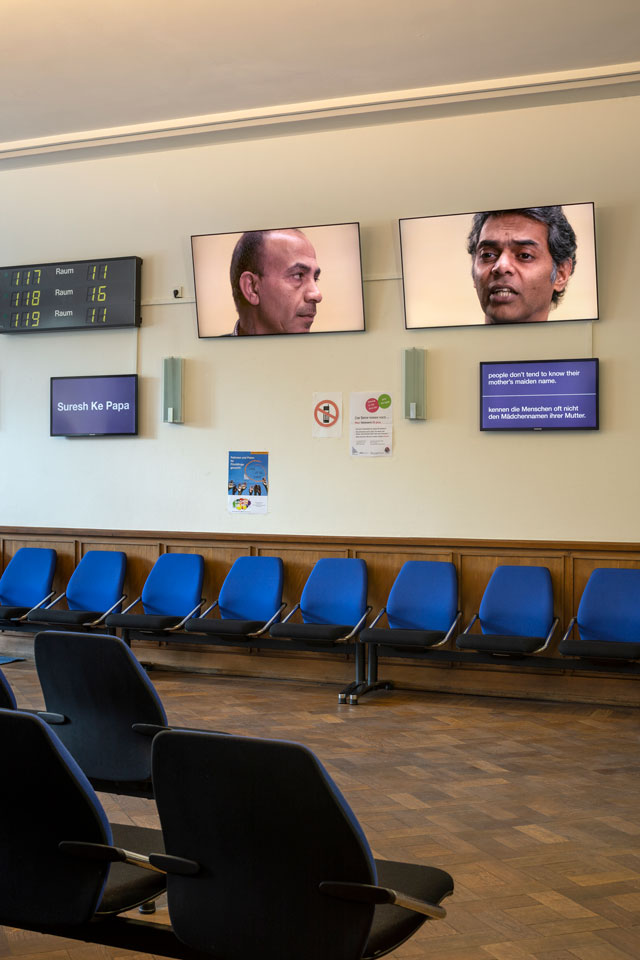
Nicoline van Harskamp. Mein Name ist Sprache (My Name is Language), 2019. Ruhr Ding, Oberhausen. Photo: Urbane Künsten Ruhr.
The subtitle screens are operated live, by the way – there is a person behind the scenes clicking through pre-made slides, and so actors can’t improvise their lines. I also added a “names screen”; this screen shows the name in full, written in the Roman alphabet, whenever an actor speaks it. It adds a sort of administrative quality to the piece.
A majority of people working in the art world strive for a “native English” and consider their own English to be a broken or faulty language, but I do think that this is a language, or even a medium of its own. It should be recognised and developed as such. I think a lot about what could happen to English in the future, especially if everyone could contribute to it. What if, instead of learning it in school, we learn it in the way we speak it with each other?
Apart from different languages, there are also a lot of different Englishes in the performance. There are the so-called “postcolonial” varieties such as Irish, Nigerian and Indian, as well as English spoken by people from Poland or Afghanistan. In Oberhausen and Graz, there was also a variety of “Deutschen”: German productions ranging from “native” ones to those spoken by people from Brazil, Togo, Cameroon and Syria. Until that moment, I had not thought of German as a vehicular language, probably because of my bias as a native speaker of Dutch, which is similar to German and rightly perceived by its speakers as a very marginal language.
SAT: They are quite beautiful to listen to – all the different Englishes. At the end of the performance, you mentioned that you don’t like to use the word “accent”, but instead use the word “production”. Could you talk about the difference between the two?
NVH: “Accent” implies that the English being spoken is affected by the person speaking it. I would say, instead, that English affects the person. I am not interested in “native English”. I am interested in the vehicular language. But native strains of English still hold on to their primacy and set the standard. If we completely ignore Oxford English, and whatever the US equivalent is, and look at how people use the language instead – or how they so-called “misuse” the language – something much more interesting happens. In a way, native-like English is minor compared to the other types of Englishes in the world. A focus on these is a great opportunity to set English free from its centre. And this is where my interest in spoken word comes from. Because it’s the only playground we might still have left.
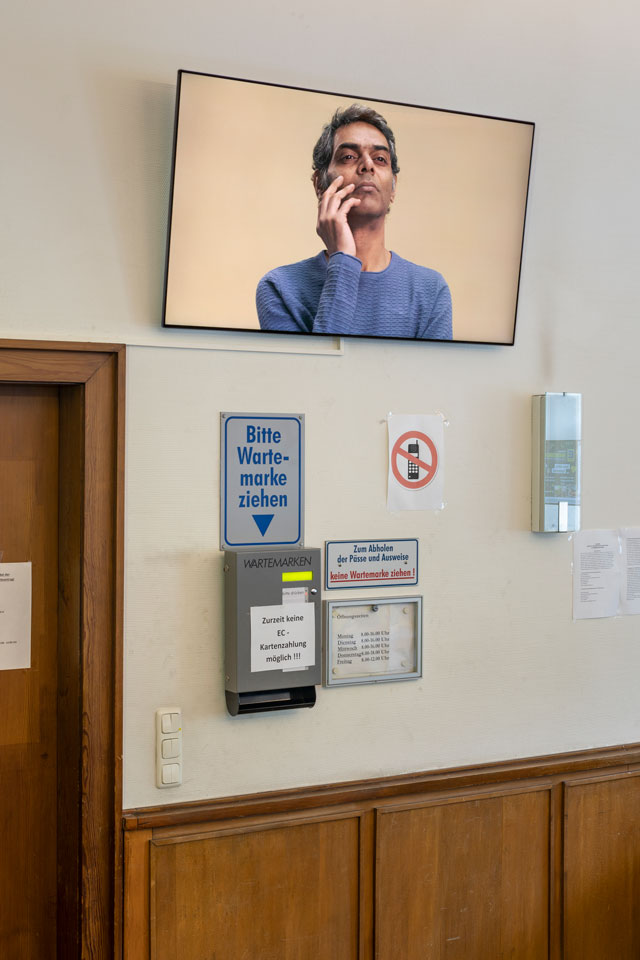
Nicoline van Harskamp. Mein Name ist Sprache (My Name is Language), 2019. Ruhr Ding, Oberhausen. Photo: Urbane Künsten Ruhr.
The notion of accent is so far away from this. If you don’t measure the language from a standard any more, there is nothing left to compare it to. The term production covers much better how no mouth produces the sounds of a language in the same way, because everybody has their own influences and abilities – or what you could call a linguistic biography.
SAT: An investigation into English, and how it evolves or operates in the contemporary moment, seems like an almost perfect metaphor for the failure of globalisation. Is this an argument you are trying to make through your work?
NVH: Yes, the work is a way of looking at the failure of globalisation but, more than that, it is also a way of looking at the complexity of a globalised world. In 2015, I was a resident artist at the Bar Project in Barcelona, a city in which a large number of NGOs that deal with language issues have their headquarters. This is not a coincidence: a struggle for the rights of Catalan speakers is prevalent there. I interviewed people about linguistic rights and language preservation, but felt that some of the NGOs were quite conservative. For example, people talked to me about their land, their blood and their language, which is not exactly the rhetoric we should be using to oppose globalism. Of course, it’s a difficult situation in Catalonia, but this is happening all over the world now – people are opposing globalism through a very narrow, nationalistic or patriotic lens.
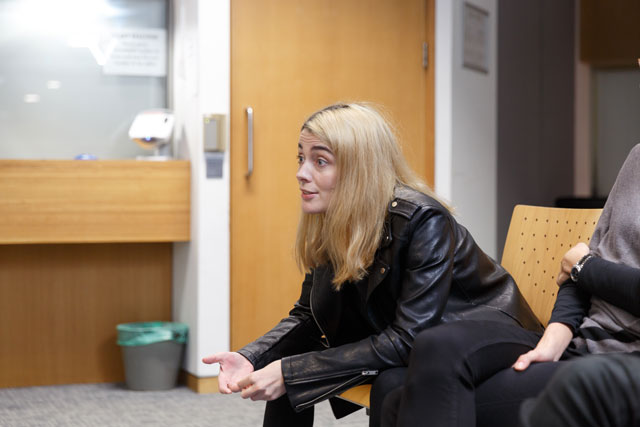
Nicoline van Harskamp. My Name is Language, 2018. Dublin Theater Festival / Project Art Centre, Dublin. Photo: Killian Broderick.
It becomes hard to critique English and the loss of language diversity in the world without getting a little a preservationist, or worse, nationalist. And this has a lot to do with power. You can feel this especially when speaking to people who have to learn English because they are waiting behind a fence somewhere on a European border, or have been trapped there. I have spoken to so many refugees who have said that they learn English on the way because they have to. English is a way to survive.
Otherwise, English is mostly used by what an Esperantist once described to me as the “locust class” – the privileged travelling class – who, because of globalisation, have a great mobility around the world. Wherever they go, it’s all kind of the same place and they all speak English. But then there’s the class at the opposite end of the social and economic ladder, those that are displaced and forced to use that same language.
SAT: I overheard a conversation the other day in which a white European complained about the proliferation of Zara shops all over the world and suggested that wearing lederhosen could be a way to resist this “sameness”. But, actually, Zara signifies a kind of social mobility. In India, especially, its clothes are aspirational, a marker of success, and I feel there is something to be said about globalism and social mobility. Only the deeply privileged can deny the aspirations that they have already consumed, surpassed or intellectualised. Like Zara, English is a marker of social mobility, too.
NVH: Yes, totally, and if we were to frame the question differently it would be something like: if you would eradicate capitalism and globalism, or capitalist globalism, then what do you do with the vehicular languages (like English)? This is what my work PDGN (2016) takes as its premise: we are in a post-capitalist society, and people are recycling buildings and material from this era – our capitalist era – and there is also some leftover language. They are trying to build something from the ruins of English, so to speak.
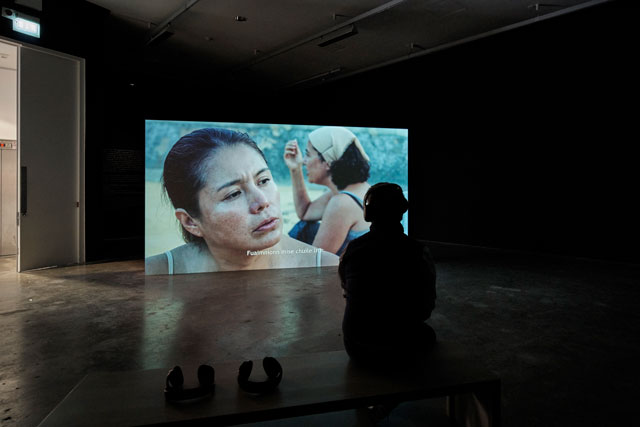
Nicoline van Harskamp. PDGN, 2016. Installation view at Project Art Centre, Dublin. Photo: Project Art Centre.
Then there is also the politics of not understanding everything, or of staging misunderstanding. With My Name Is Language, each time it is performed there are so many localised nuances that not everyone in the audience is able to understand everything. And I am playing with that – whether it’s OK for audiences not to understand. I think some people are accepting of this, because they are used to not understanding, while some people are not, because they expect everyone to adapt to their language.
There is a great play by the Irish playwright Brian Friel called Translations (1980). We used an excerpt of it in the Dublin version of My Name Is Language. In Friel’s play, there are Irish people who do not understand English and English people who do not understand Irish, but the play is written entirely in English. So you will find people on the stage speaking to one half of the stage who don’t understand what they are saying. There is a real misunderstanding, but we, as the audience, can understand everything. It really made me think – in literature, in art, in theatre – how much misunderstanding do we accept? In my short play Some Name Some Noun Simply (2017), I staged a story – in the “future English” I had created for PDGN – with three actors live on stage. After each performance, we organised a Q&A where I asked the actors and the audience: is it OK that you didn’t completely understand what we said? What does it mean for you to not fully understand? What is the value of this opacity?
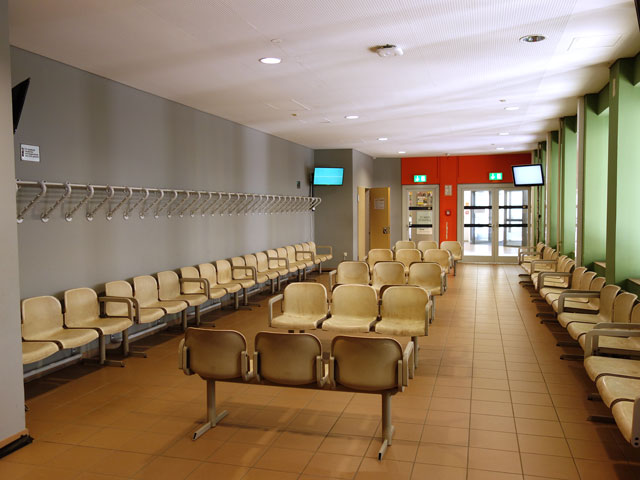
Nicoline van Harskamp. Mein Name ist Sprache (My Name is Language), 2018. Steirischer Herbst, Graz. Photo: Nicoline van Hartkamp.
SAT: Your work also makes me think about the transition of oral languages into written ones. In India, I grew up learning that Sanskrit is the oldest language of the subcontinent, but actually Sanskrit was just the first language to make the transition from oral to written, and this transition was controlled by the caste system. Upper-caste brahmins had singular command over the language, so it has a lot to do with power and hegemony. Perhaps regional dialects are more ancient than Sanskrit, in how they carry the trace of generations of oral history.
NVH: The history of English is not so different. It was canonised by the trading class, the up-and-coming middle class of England at the time. The minute a language is written down it is canonised. In terms of the oral traditions, something similar is true for names. In each version of My Name Is Language, there is a character that says:
“All over the world, the old establishment keeps the names of the ancestors but in the lower socioeconomic class, names are more subject to fashion. Self-naming is a powerful tool. Socrates pointed out that only slaves cannot name themselves.
“Names can be stabilised and canonised like languages. The more complex the social structure, the more fixed the names. The system needs an exact label to take your taxes, to punish you, to send you to the military, to monitor your data. But if references were all I cared about, I might as well be named with numbers.”
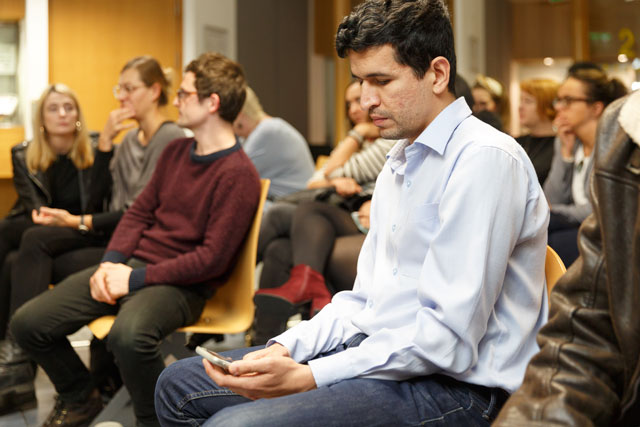
Nicoline van Harskamp. My Name is Language, 2018. Dublin Theater Festival / Project Art Centre, Dublin. Photo: Killian Broderick.
In one part of the performance – and this is the heart of the work for me – the characters talk about nicknames, and countries or cultures where names are still very much in the everyday language, as opposed to names that are completely abstracted from language because they have been frozen in a time of canonisation and nationalisation. What canonisation means is changing under globalism. In surveillance capitalism, names have to be entered into interconnected databases. This is something beyond canonisation – databases where, if you misspell your own name, you could get into trouble.
I have also looked a lot into creolisation, world Englishes and postcolonial Englishes. They give great insight into what happens when language is “free”, or allowed to change. In Decolonising the Mind (1984), Ngũgĩ wa Thiong’o asks: “Why do we need English books of literature in places like Kenya? Why do we invest in other people’s languages, or continue to invest in the coloniser’s language? Is it because we still want to be able to communicate with other English-speaking people about our experiences?”
SAT: I studied in the UK and someone (white and British) once told me I should stop writing in English, and write in an Indian language, instead. That this would be a decolonial act. This hurt me. I grew up speaking English – it’s my language, too. The Chinese academic Rey Chow writes that keeping the coloniser’s language is also a way of decolonising. It is a way of interfering with the canon – as you say creolisation does – and maybe even decentralising the canon.
NVH: It is important to ask whose language it is that we want to use, and whether it is co-optable. In a lot of activism, co-option is a strategy, to divert what is co-opted – not for reformist purposes, not to make English “better” – but to use it to your own benefit. It’s a paradox: the opposite of globalisation is not nationalism, and the opposite or the solution to using vehicular language is not using a very minor in-group language. The closest I got to this paradox is hearing people talk about their names – names are almost like a physical phenomenon. People will talk about their names as if they are part of their bodies. When you say that a name is language like any other word, people will always object to that limited definition. It doesn’t seem to be at all important that a name exists in a dictionary or a register. But it has to exist in a person’s internal onomasticon: the place in the brain where names are “stored”. And our onomasticons do not differ along national borderlines or linguistic lines, but in much more complex ways.
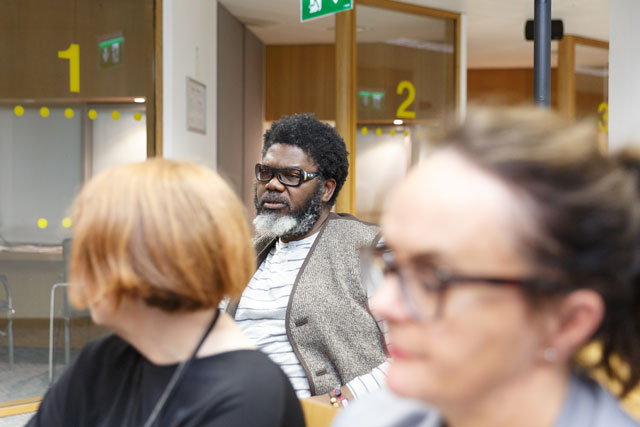
Nicoline van Harskamp. My Name is Language, 2018. Dublin Theater Festival / Project Art Centre, Dublin. Photo: Killian Broderick.
SAT: An undercurrent through My Name Is Language seems to be about how names function in their relationship to the law. At Steirischer Herbst 2018, the performance took place in a kind of waiting room. It reminded me of the detention rooms I have been kept in at airports. A particular kind of atmosphere is created there, where there is a lack of solidarity – no one is making eye contact, and everyone sits in degrees of humiliation and fear. The performance, with its storytelling and exchange, seemed almost like a dream scenario of what those rooms could be like instead. Is the room important to the piece?
NVH: I was definitely thinking about rooms where names are called out. The room could be an office where your passport is registered; or where your identity is confirmed or considered illegitimate by the law of the state. In Dublin, the performance took place in the waiting room of the housing office of the city during a weekend. This felt timely because there is a housing crisis in Dublin right now and the room is filled with very vulnerable people on weekdays. In Oberhausen, the piece was a two-month video installation in the waiting room of the register office of the city. The subtitle and name screens were hung just under the screen that indicated whose turn it was to enter the door to the “Einwohnermeldewesen” (a loaded, haunting term that means civil registration) Both types of information merged: the soundtracks of the speaking actors on the screen, and the bell for when the next person was called in.
In Graz, we had to create a set in a university building, because no government office would allow their waiting areas to be used. The play started with the first speaker saying, “Ich bin Mohammed” (I am Mohammed), and I wanted everyone in the audience to think about what it means for somebody to say that out loud in a packed, quiet waiting room in Austria. The room is also a hyperreal or unreal place. The work tries to think of names as language in order to gain some insight into what’s going in the lives of others, or to empower each other and ourselves. If you think about these places of transit – where people speak creolised languages, hybrid languages – there is a lot of potential for what can happen.
• This autumn, Nicoline van Harskamp will launch Englishes MOOC, an art project in the form of a free Massive Online Open Course. Over six weeks, participants can develop practical skills towards making new varieties of English emerge as a medium of expression, mediation and education in art practices around the world. You can sign up at: englishes-mooc.org.